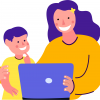Media Literacy
About it
In the MEDIA LITERACY section, teachers and students will go through a lot of fun and educative lessons, here are some examples:
"About your computer"
In this lesson, students will have the opportunity to explore the world of computers in depth. They will begin by learning about the origins and evolution of computers and understanding the historical context that led to their creation. From there, students will dig into the inner workings of computers and learn how they operate at a fundamental level. They will explore topics such as data, ROM, and RAM. Furthermore, students will learn how to use a mouse or mousepad, which are essential input devices for navigating the computer interface. They will also be introduced to the keyboard and learn how to use it to input text and commands. By the end of this lesson, students will have a solid foundation in computer technology and be equipped with the knowledge necessary to understand where computers come from and how they work.
"You in the Internet"
In this lesson, students will learn about how the internet recognizes our online addresses and how IP addresses work. They will understand the importance of IP addresses and how they are used to connect devices to the internet. Students will also learn how to use Google to check their own IP addresses. In this lesson, students will also learn about how the internet knows what we like. Moreover, students will learn about the meaning of an anonymous user. They will understand the importance of anonymity online and how it can be used to protect our privacy and security. Furthermore, students will learn how to leave comments on the internet respectfully. They will understand the impact that online comments can have and the importance of being respectful and mindful of others when leaving comments. Overall, this lesson will give students a fundamental understanding of their online presence and the technical aspects of the internet that make it all work. They will also gain an understanding of responsible online behavior and the importance of respectful communication online.
"Stronger than the Bully"
In this lesson, students will learn about the presence of "haters" and negative feedback online. They will understand the effects of negative comments and feedback and how they can make us feel. Students will explore the dangers of criticizing others and why it is never a good idea to do so. Moreover, students will learn how to detect the presence of a "hater" or a bully online. They will understand the signs of cyberbullying and how to identify negative comments or feedback that are intended to hurt or harm others. Students will also learn about the importance of reporting these types of users and how to act when encountering them online. Furthermore, students will learn which online environments are safer than others. Overall, this lesson will give students a comprehensive understanding of the dangers of cyberbullying and the negative effects of criticism and negativity online. They will come away with the knowledge and tools they need to detect and report online bullies, protect themselves and others from online threats, and create a safer and more respectful online community.
"Typing, typing, typing..."
In this lesson, students will learn about the importance of typing skills and the various machines that have a keyboard. They will create their own Virtual Phonics keyboard and learn about adding sprites and the 'key is pressed' event. Students will also learn about phonics sounds and how to position their hands on the keyboard correctly. They will gain an understanding of the techniques used to improve typing speed and accuracy. Furthermore, students will participate in exercises designed to help them gain agility with their fingers and improve their typing skills. Overall, this lesson will provide students with a foundation in typing skills that will serve them well in a variety of contexts. They will come away with a deeper understanding of the keyboard, its layout, and how to use it effectively.
"Learning to give feedback"
In this lesson, students will learn about the different types of reactions that can occur when giving or receiving feedback. They will explore the benefits of both criticism and compliments and how they can be used effectively to improve performance or build relationships. Students will also discuss the usefulness of feedback in the online environment, including how it can help people grow and improve in their skills, and how it can be used to build stronger relationships with others. Additionally, students will learn how to structure the best possible feedback. This includes identifying the key points to address, using constructive language, and providing specific examples or suggestions for improvement. By the end of the lesson, students will have a deeper appreciation for the power of feedback to inspire growth and change and will be better equipped to give feedback that is meaningful, constructive, and supportive.
About it
Every day, students come into contact with the digital world around them. Watching Youtube videos on their Ipad, making and sharing TikTok's, or playing online games. But how do children deal with this digital world? How should children behave online?
The impact of new media on children is increasing. In this digital society, students need new skills in order to function, produce and participate. This applies both now and in the future. The Council of Culture and Media summarises all these skills in the term: "Media Literacy". In other words, the whole of knowledge, skills, and mentality that allows citizens to move consciously, critically, and actively in a complex, changing, and fundamentally digitizing world.
GalactIQ assists teachers in teaching these skills to students in an accessible way. Learn about what the internet is, how advertising works, the impact of online communication and how it is perceived by others, and much more. Start an open conversation, take quizzes, watch videos and work together.
Information and awareness
The digitization of information and the ever-improving infrastructure of the Internet enables anyone worldwide to publish and distribute information quickly. The amount of digital information is increasing rapidly. But how can students distinguish real news from fake news? How can students recognize which sources are reliable or relevant?
Information literacy includes the ability to formulate and analyze information from various sources. Students learn to search, process, and apply information in a critical and systematic way.
In a nutshell,
On the Media Literacy planet, students learn to navigate critically and independently through the digital world. In addition, a lot of attention is focused on ethics within new media. Learn what the impact of digital communication is and how it relates to offline communication.
In order to lay an even stronger foundation in the field of media literacy, the knowledge acquired on this planet is applied to other planets within galactIQ. For instance, students not only learn what a website is but also learn how to make one themselves on the web-development planet. This combination ensures that within a few years students will be experts of the digital world around them!












